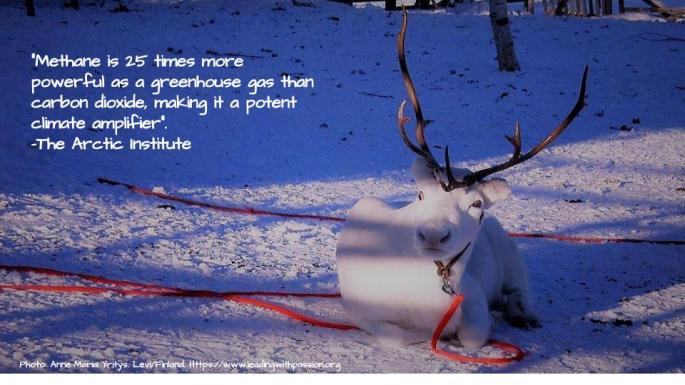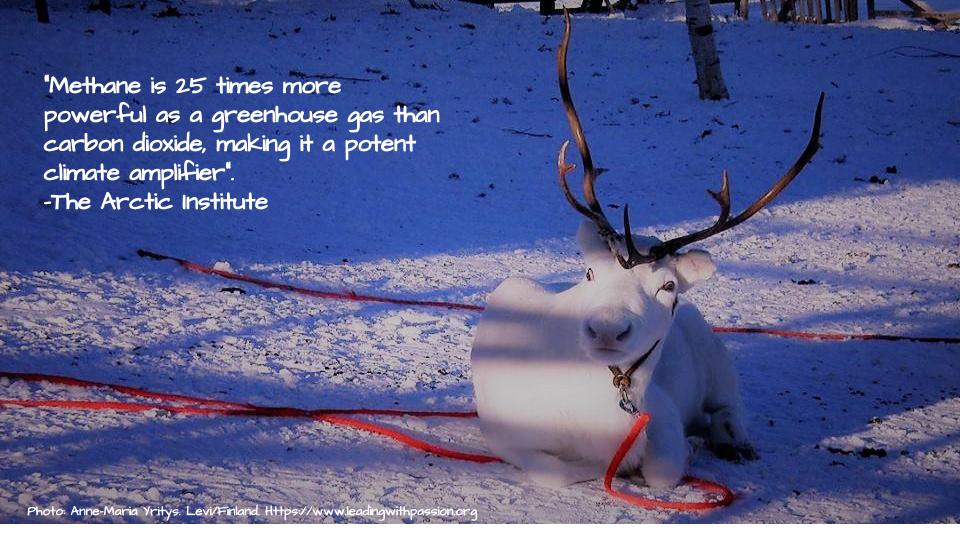
In my previous post, Methane is an Environmental Wildcard, I wrote a short introduction to what methane is and how it affects our environment. The Arctic Institute is one of the organizations worldwide that has been conducting research upon methane and its impacts in the Arctic region. As a reminder, the Arctic region consists of all the areas upon Earth that are located above the Arctic circle, all the way to the North Pole. The Arctic region thus, includes parts of the United States, Canada, Denmark (Greenland), Iceland, Norway, Sweden, Finland and Russia.
According to The Arctic Institute, with headquarters in Oslo, Norway, methane is the second most emitted greenhouse gas on our planet after carbon dioxide. The problem with methane emissions is that it is at least 22 times stronger than carbon dioxide, which makes it especially dangerous when released into Earth´s atmosphere. In addition, according to The Arctic Institute, most methane emissions are being released in geographical areas south of the Arctic region, but much of which end up IN the Arctic warming its climate faster.
The Arctic region itself is also a huge “storage room” for methane, which can be found under permafrost. When permafrost thaws, previously naturally stored methane reserves are released into our atmosphere, our soils and our oceans (and, other water sources), causing additional warming through a greenhouse effect. By now, everyone who has been following and reading my posts should be aware of what greenhouse gases are, and how they contribute to climate change and the rapid warming on our planet.
Greenhouse gases are natural to a certain extent on our planet, but with the rate they have been released through human activities into Earth´s atmosphere in the past one hundred years only, has drastically increased the greenhouse effect and the warming of our planet. This is why we have no other option than to transform our local/global economies into sustainable solutions. Sustainability means that we find completely new, fossil-free (free from the usage of coal, gas, and oil as energy sources) means of energy production, something that has been widely understood in many parts and countries in our world already.
Texas, which has always been known as an oil-producing state in the U.S.A., has since long transformed its energy production to using for instance solar energy and wind energy. China is doing the same, in addition to China investing immense amounts of money into the African continent with new solar energy plants. The United Arab Emirates is also investing heavily into renewable energy sources, as are Denmark and Sweden. In short, we have many options regarding renewable energy sources: solar energy, wind energy, ocean energy. We could easily provide the whole world with solar energy only, if we just wanted to. The need for environmentally damaging and harmful sources of energy, including dams, nuclear plants, oil drilling, gas drilling and coal burning will become less and less attractive. The sooner the better. We deserve to create and to live on a healthy planet, with clean air, healthy water sources (lakes, rivers, oceans), and healthy soils. A healthy, pollution-free environment is a basic human right, for every citizen on our planet.
Learn more about the Arctic region, the Arctic Sea and methane by watching Climate State´s video “Methane in the East Siberian Arctic Shelf (2017)”:
Connect with me on Twitter @annemariayritys. For climate/environment-related posts only @GCCThinkActTank. Subscribe to Leading With Passion to receive my latest posts.
Take a step further to create YOUR online business. Learn more about the many benefits of how to create a beautiful website with WordPress.com and how to monetize your blog/website:
WordPress.com – Create A Beautiful Website
Jetpack – The ideal way to experience WordPress – Code-free Customization
WooCommerce – The most customizable eCommerce platform for building your online business


2 thoughts on “Climate Amplifier Methane”